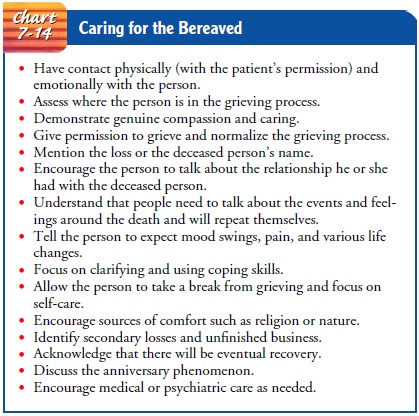Chapter: Medical Surgical Nursing: Individual and Family Considerations Related to Illness
Loss and Grief
Loss and Grief
Loss is a part of the
life cycle. All people experience loss in the form of change, growth, and
transition. The experience of loss is painful, frightening, and lonely, and it
triggers an array of emotional re-sponses (Chart 7-13). People may vacillate
between denial, shock, disbelief, anger, inertia, intense yearning, loneliness,
sadness, loss of control, depression, and spiritual despair (Brewster, 1999).
In addition to normal
losses associated with life cycle stages there are the potential losses of
health, a body part, self-image, self-esteem, and even one’s life. When loss is
not acknowledged or there are multiple losses, anxiety, depression, and health
prob-lems may occur. Likewise, people with physical health problems, such as
diabetes mellitus, acquired immunodeficiency syndrome
(AIDS), cardiac
conditions, gastrointestinal disorders, disabili-ties, and neurologic
impairments, tend to respond to these ill-nesses with feelings of grief.
People grieve in
different ways, and there is no time line for completing the grief process. The
time of grieving often depends on the significance of the loss, the length of
time the person was known and loved, the anticipation of or preparation for the
loss, the person’s emotional stability and maturity, and the person’s coping
ability (Arnold & Boggs, 1999).
Regardless of the duration of the grieving process, there are two basic
goals: (1) healing the self, and (2) recovering from the loss. Other factors
that influence grieving are the type of loss, life expe-riences with various
changes and transitions, religious beliefs, cul-tural background, and
personality type (Kemp, 2000). Some patients may resort to abuse of
prescription medications, illegal drugs, or alcohol if they find it difficult
to cope with the loss; the grief process is then complicated by the use of
addictive substances.
NURSING IMPLICATIONS
Nurses identify patients
and family members who are grieving and work with them to accomplish the four
major tasks of the grief process: (1) acceptance of the loss, (2)
acknowledgment of the intensity of the pain, (3) adaptation to life after the
loss, and 4) cultivation of new relationships and activities (Worden, 1982).
Chart 7-14 outlines nursing care activities useful for those who are bereaved.

Another responsibility of the nurse is to assess and differenti-ate between grief and depression by knowing the common thoughts, feelings, physical or bodily reactions, and behaviors as-sociated with grief compared with depression (see Chart 7-14). The physical response to grief includes the sensation of somatic distress, a tightness in the throat followed by a choking sensation or shortness of breath, the need to sigh, an empty feeling inside the abdomen, lack of muscle power, and intense disabling dis-tress. Grief can further debilitate an already compromised patient and can have a strong impact on family functioning.
Related Topics